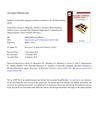 19 citations,
March 2011 in “Cutaneous and Ocular Toxicology”
19 citations,
March 2011 in “Cutaneous and Ocular Toxicology” Some chemicals absorbed through the skin can cause serious health problems.
 18 citations,
June 1999 in “Statistical Methods in Medical Research”
18 citations,
June 1999 in “Statistical Methods in Medical Research” The document concludes that PK/PD modeling is important for determining the safe and effective dosages of drugs.
 17 citations,
October 2016 in “Artificial Cells Nanomedicine and Biotechnology”
17 citations,
October 2016 in “Artificial Cells Nanomedicine and Biotechnology” Using tiny fat particles to deliver arginine to hair follicles could be a new way to treat hair loss.
[object Object]  17 citations,
May 1975 in “Clinical Pharmacology & Therapeutics”
17 citations,
May 1975 in “Clinical Pharmacology & Therapeutics”  16 citations,
March 2017 in “Journal of inclusion phenomena and macrocyclic chemistry”
16 citations,
March 2017 in “Journal of inclusion phenomena and macrocyclic chemistry” Minoxidil mixed with 2-hydroxypropyl-β-cyclodextrin in water can improve hair growth more than minoxidil alone.
 16 citations,
November 1992 in “Journal of International Medical Research”
16 citations,
November 1992 in “Journal of International Medical Research” ViviScal®, a food supplement, was found to be highly effective in treating hereditary hair loss in young males, while fish extract showed no impact.
 15 citations,
November 2019 in “Cutaneous and Ocular Toxicology”
15 citations,
November 2019 in “Cutaneous and Ocular Toxicology” Minoxidil tretinoin liposomal based hydrogel shows promise for effective treatment of hair loss by delivering both drugs at the same time.
 15 citations,
November 2002 in “Cardiology in Review”
15 citations,
November 2002 in “Cardiology in Review” Cardiovascular drugs can cause various skin problems, so recognizing these reactions is important.
 15 citations,
January 2000 in “Japanese Heart Journal”
15 citations,
January 2000 in “Japanese Heart Journal” A man developed heart problems after using a baldness treatment for 4 months, suggesting that people with heart issues should avoid this treatment.
 13 citations,
November 2014 in “Pediatric emergency care”
13 citations,
November 2014 in “Pediatric emergency care” Ingesting minoxidil can cause serious heart issues; keep away from children and improve packaging.
 12 citations,
June 2019 in “Actas dermo-sifiliográficas/Actas dermo-sifiliográficas”
12 citations,
June 2019 in “Actas dermo-sifiliográficas/Actas dermo-sifiliográficas” Proper skin toxicity management in chemotherapy is key to continuing treatment and keeping patient quality of life high.
 12 citations,
October 2012 in “International Braz J Urol”
12 citations,
October 2012 in “International Braz J Urol” Finasteride effectively and safely treats recurrent priapism in children and adolescents with sickle cell disease.
 11 citations,
January 2002 in “Dermatologic Surgery”
11 citations,
January 2002 in “Dermatologic Surgery” Using minoxidil before and after facelift surgery can effectively prevent temporary hair loss without causing other complications.
 11 citations,
April 1990 in “Australasian Journal of Dermatology”
11 citations,
April 1990 in “Australasian Journal of Dermatology” Minoxidil modestly increases hair growth in men with early baldness and is safe to use.
 11 citations,
January 1987 in “Dermatology”
11 citations,
January 1987 in “Dermatology” Minoxidil works for 56% of balding men with specific criteria.
 9 citations,
May 2021 in “Archives of Dermatological Research”
9 citations,
May 2021 in “Archives of Dermatological Research” Home-based skin care devices are generally safe and effective for hair removal, promoting hair growth, treating wrinkles and acne, but results for psoriasis treatment are mixed.
 9 citations,
March 2016 in “Natural Product Research”
9 citations,
March 2016 in “Natural Product Research” Some flavonoids may help with hair growth by affecting blood vessel function in hair follicles.
 9 citations,
June 2011 in “International Journal of Cosmetic Science”
9 citations,
June 2011 in “International Journal of Cosmetic Science” The new mild shampoo helped prevent hair loss in the subjects.
 9 citations,
March 1985 in “Head & Neck Surgery”
9 citations,
March 1985 in “Head & Neck Surgery” Topical minoxidil is the most promising treatment for male pattern hair loss, but more research is needed to confirm its effectiveness and safety.
 8 citations,
January 1989 in “Annual Reports in Medicinal Chemistry”
8 citations,
January 1989 in “Annual Reports in Medicinal Chemistry” Hair loss from alopecia areata and androgenetic alopecia can be treated, but more effective and safer treatments are needed.
 8 citations,
January 1989 in “Journal of Dermatological Treatment”
8 citations,
January 1989 in “Journal of Dermatological Treatment” This text talks about how to treat hair loss in women. It suggests different options and stresses the importance of support.
[object Object]  7 citations,
January 2019 in “Headache”
7 citations,
January 2019 in “Headache” Hormone therapy may increase migraines in transgender women and decrease them in transgender men; more research is needed on migraine management in transgender individuals.
 7 citations,
May 2016 in “SpringerPlus”
7 citations,
May 2016 in “SpringerPlus” Some breast cancer patients on hormone therapy experience hair loss, and treatments like certain topical inhibitors and supplements may help without harming their cancer prognosis.
 7 citations,
November 1987 in “Pharmacotherapy: The Journal of Human Pharmacology and Drug Therapy”
7 citations,
November 1987 in “Pharmacotherapy: The Journal of Human Pharmacology and Drug Therapy” Minoxidil can help thicken hair in some people with male pattern baldness, especially if used early and continuously.
 6 citations,
October 2018 in “Lasers in Medical Science”
6 citations,
October 2018 in “Lasers in Medical Science” Low-level laser therapy using near-infrared light may help heart conditions and promote healing by releasing nitric oxide.
 6 citations,
January 2016 in “Bioorganic & Medicinal Chemistry Letters”
6 citations,
January 2016 in “Bioorganic & Medicinal Chemistry Letters” Some minoxidil combinations can help differentiate leukemia cells without harming other cells.
 6 citations,
June 2011 in “Pharmacognosy Journal”
6 citations,
June 2011 in “Pharmacognosy Journal” Many products for hair re-growth exist, but a perfect treatment without side effects has not yet been found.
 6 citations,
October 2000 in “International Journal of Dermatology”
6 citations,
October 2000 in “International Journal of Dermatology” Preventing hair loss is more effective than regrowth; oral finasteride is a realistic option.
 5 citations,
March 2020 in “Journal of Cosmetic Dermatology”
5 citations,
March 2020 in “Journal of Cosmetic Dermatology” High concentration Minoxidil and Carboxygas effectively treated resistant hair loss with no side effects.
 5 citations,
March 2016 in “Acute medicine & surgery”
5 citations,
March 2016 in “Acute medicine & surgery” Swallowing a lot of minoxidil, a hair growth liquid, can cause severe and long-lasting low blood pressure.






























